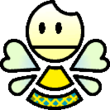Nimbi: Difference between revisions
m (Robot: Changing template: Foreignname) |
mNo edit summary |
||
| Line 2: | Line 2: | ||
|image=[[File:SPM Luvbi 1.png|130px]]<br>[[Luvbi]], a female '''Nimbi''' created from a [[Pure Heart]]. | |image=[[File:SPM Luvbi 1.png|130px]]<br>[[Luvbi]], a female '''Nimbi''' created from a [[Pure Heart]]. | ||
|full_name=Nimbi | |full_name=Nimbi | ||
|related=[[Skellobit]]s<br>[[Shayde]]s | |related=[[Skellobit]]s<br>[[Shayde]]s | ||
|first_appearance=''[[Super Paper Mario]]'' ([[List of games by date#2007|2007]]) | |first_appearance=''[[Super Paper Mario]]'' ([[List of games by date#2007|2007]]) | ||
| Line 17: | Line 16: | ||
|width2=110 | |width2=110 | ||
}} | }} | ||
'''Nimbis''' are the angel-like citizens of [[The Overthere]] in ''[[Super Paper Mario]]''. Their species name appears to be derived from the word ''nimbus'', a type of cloud. The word additionally references their appearance and habitat. The Nimbis speak in Elizabethan English, such as that used in the [[wikipedia:King James Bible|King James Bible]]. However, the dialect the Nimbis speak appears simply to replace common pronouns such as "I" or "you" with Elizabethan equivalents (mine, thou). These words can be changed depending on whether they are the subject or not, such as "you" being thou (subject) and thee (objective). Also, the suffix -est seems randomly tacked to certain verbs. (e.g. "thou-knowest-what" instead of "you-know-what"). In proper [[wikipedia:Elizabethan era|Elizabethan era]] grammar, "knowest" (for example) is the equivalent of the modern day "knows". Saying "tellest me, now, Mother," as Luvbi does, | '''Nimbis''' are the angel-like citizens of [[The Overthere]] in ''[[Super Paper Mario]]''. Their species name appears to be derived from the word ''nimbus'', a type of cloud. The word additionally references their appearance and habitat. The Nimbis speak in Elizabethan English, such as that used in the [[wikipedia:King James Bible|King James Bible]]. However, the dialect the Nimbis speak appears simply to replace common pronouns such as "I" or "you" with Elizabethan equivalents (mine, thou). These words can be changed depending on whether they are the subject or not, such as "you" being thou (subject) and thee (objective). Also, the suffix -est seems randomly tacked to certain verbs. (e.g. "thou-knowest-what" instead of "you-know-what"). In proper [[wikipedia:Elizabethan era|Elizabethan era]] grammar, "knowest" (for example) is the equivalent of the modern day "knows". Saying "tellest me, now, Mother," as Luvbi does, is therefore incorrect grammar, as it translates to "Tells me, now, Mother". In terms of appearance, most of the Nimbis look nearly identical to each other except that females have hairstyles, and many of their names are based on days, colors, seasons, or months. | ||
{{br|left}} | {{br|left}} | ||
==Notable Nimbis== | ==Notable Nimbis== | ||
| Line 38: | Line 37: | ||
|Jap=エルエル人 | |Jap=エルエル人 | ||
|JapR=Eruerujin | |JapR=Eruerujin | ||
|JapM=Erueru people}} | |JapM=Erueru people | ||
}} | |||
{{SPM}} | {{SPM}} | ||
[[Category:Nimbis]] | [[Category:Nimbis|*]] | ||
[[Category:Super Paper Mario Species]] | [[Category:Super Paper Mario Species]] | ||
Revision as of 05:18, August 24, 2017
Nimbis are the angel-like citizens of The Overthere in Super Paper Mario. Their species name appears to be derived from the word nimbus, a type of cloud. The word additionally references their appearance and habitat. The Nimbis speak in Elizabethan English, such as that used in the King James Bible. However, the dialect the Nimbis speak appears simply to replace common pronouns such as "I" or "you" with Elizabethan equivalents (mine, thou). These words can be changed depending on whether they are the subject or not, such as "you" being thou (subject) and thee (objective). Also, the suffix -est seems randomly tacked to certain verbs. (e.g. "thou-knowest-what" instead of "you-know-what"). In proper Elizabethan era grammar, "knowest" (for example) is the equivalent of the modern day "knows". Saying "tellest me, now, Mother," as Luvbi does, is therefore incorrect grammar, as it translates to "Tells me, now, Mother". In terms of appearance, most of the Nimbis look nearly identical to each other except that females have hairstyles, and many of their names are based on days, colors, seasons, or months.
Notable Nimbis
- Blubi
- Rebbi
- Yebbi
- Whibbi
- Luvbi (Pure Heart)
- Grambi
- Maybi
- Bonechill (Implied to once be a Nimbi)
- Novbi
- Fallbi
- Sumbi
- Sunbi
- Janbi
Names in other languages
| Language | Name | Meaning |
|---|---|---|
| Japanese | エルエル人 Eruerujin |
Erueru people |

